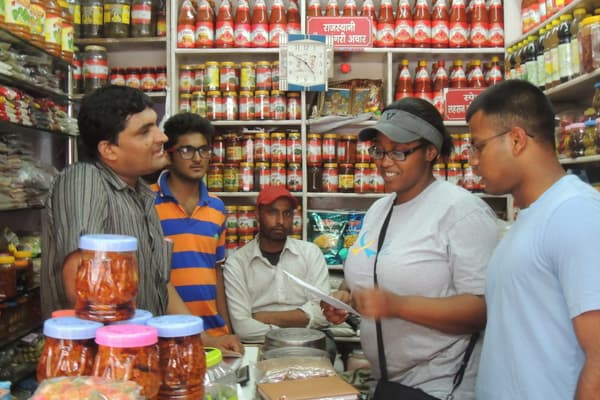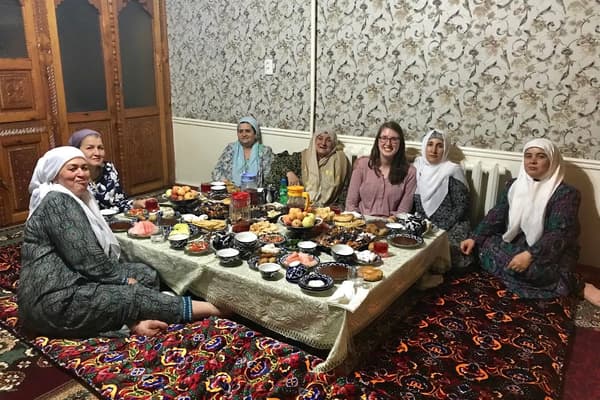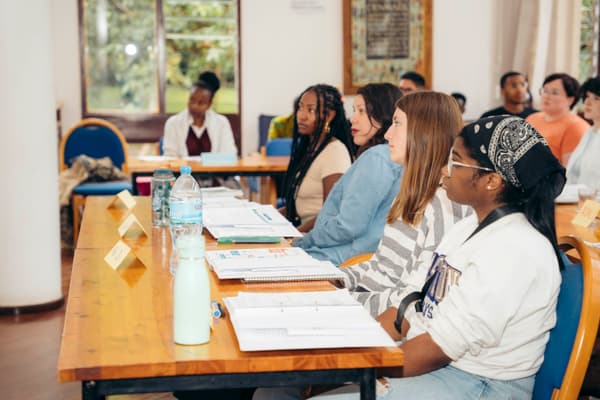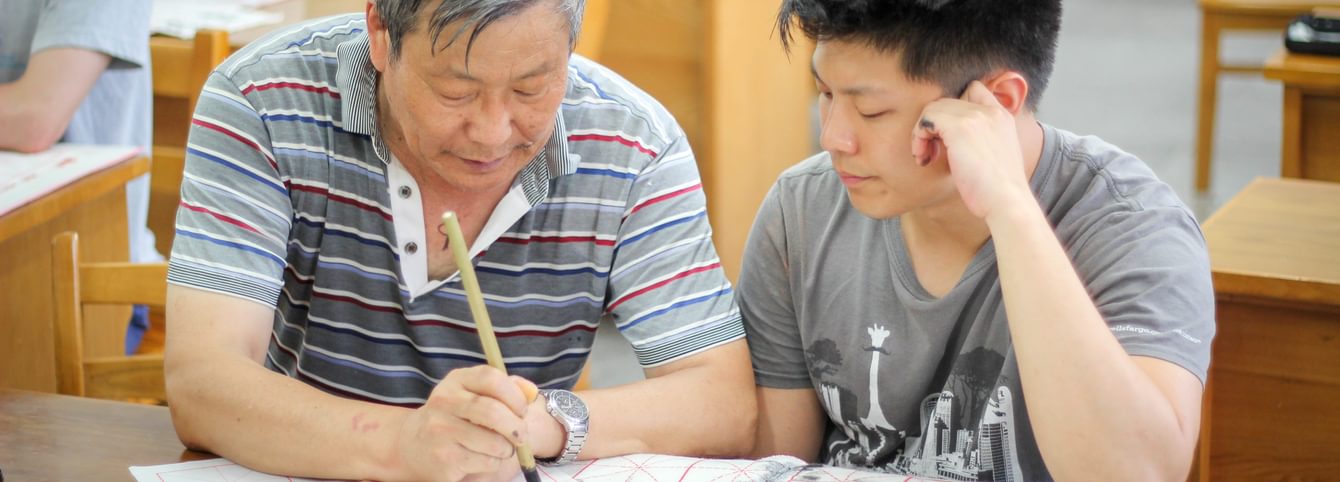Pre-Program Requirements
After submitting the CLS application, each applicant is typically contacted by email in late January and notified whether they were selected as a semi-finalist for the CLS Program. Semi-finalists are then usually notified in early March whether they were selected as a finalist, an alternate, or were not selected for the CLS Program that year. Finalists for the program receive information about their host city, host institution, and program dates at the time of notification. Finalists also receive a checklist of pre-program requirements that they must complete in order to participate in the CLS Program, the first of which is to accept or decline the CLS award.
Accepting the CLS Award
After notification, finalists have approximately a week to decide whether to accept or decline the CLS award. This is done by submitting either the Accept or Decline Form through the American Councils AIS Forms portal. Declining the CLS award will not impact a student’s ability to submit future CLS applications, but there is no guarantee that a student will be selected as a finalist if they apply again in future years. Once the Decline Form is submitted, the decision to decline the CLS award for the given year is final and cannot be reversed.
If a finalist chooses to accept the award, they are required to read through and agree to the CLS Program Terms and Conditions. This can take more time than expected. It is important that finalists read the Terms and Conditions carefully, as they detail expectations that CLS participants are required to fulfill. Once a finalist submits the Accept Form, they are able to access the additional acceptance materials described below. These materials are summarized in the YouTube video below. If a finalist has any questions about the acceptance materials, they should contact their Program Officer.
Medical Review Process
After accepting the CLS award, one of the first pre-program requirements that CLS finalists must complete is the medical review process. This process requires finalists to meet with one or more medical professionals, such as primary care providers, specialists, and mental health professionals, to complete a set of forms. The medical review process requires finalists to identify pre-existing medical and mental health conditions that they have and to work with their medical professional(s) to develop a plan for managing these conditions while on the CLS Program. Many finalists with medical and mental health conditions have successfully completed the CLS Program. Having a plan in place to maintain mental and physical well-being during the program is an important way for each finalist to ensure they are able to fully benefit from the opportunities presented during the program.
The medical review process is intended to empower finalists to understand the health risks and communicable diseases that they may encounter in their host community. Prior to meeting with their medical professional(s), finalists are required to review the guidance provided on the Centers for Disease Control and Prevention’s traveler’s health website, as well as the CDC destination page for their host country or location, which describes illnesses common in that location. Finalists are encouraged to bring a copy of the destination page to their medical appointment(s) and to ask the advice of their medical professional(s) regarding vaccinations, preventative medications, and/or other steps they can take to mitigate the health risks they may encounter in the host community.
Once a finalist completes and submits the required medical forms, the forms are reviewed by a CLS-contracted medical professional. Should the CLS-contracted medical professional have any follow-up questions, CLS staff will contact the finalist to request additional information. Finalists are required to respond to all CLS staff inquiries in a timely manner.
The medical review process can take several weeks to complete. A medical professional’s availability may be limited, and finalists may need to contact their healthcare provider(s) more than once if follow-up is required. As a result, finalists are strongly encouraged to schedule appointments with their medical provider(s) as soon as possible after receiving access to the required medical forms in AIS. Please note that the CLS Program does not cover the cost of appointments required to complete the medical review process.
Disability Accommodations Form
In addition to the medical review process, all finalists must complete the Disability Accommodations Form, which allows finalists to either decline or to request disability-related accommodations for the program. Many students with a variety of disabilities have successfully completed the CLS Program. The Disability Accommodations Form requires finalists seeking accommodations to describe the accommodations they receive at their home institution and to provide certification of these accommodations from their home institution’s Office of Disability Services.
The form also allows finalists to consider what kinds of special needs they might have during classes and other program-arranged activities and excursions, as well as in program-provided housing. In some cases, a finalist might need an accommodation that is not provided at their home university. For example, they may require refrigeration for medication that needs to be kept cold. In such cases, finalists should provide this information in the Disability Accommodation Form even if it is not possible to have it certified by the home institution’s Office of Disability Services. Finalists should direct any questions that arise as they complete the Disability Accommodations Form to their Program Officer.
After finalists seeking accommodations submit the form, CLS Program staff work with the finalist and the CLS host institute to develop a plan for the participant’s accessibility throughout the program. Because the availability of services in each CLS host community often differs from accommodations that are commonly available in the U.S., the finalist may be asked to participate in further conversations with CLS staff to clarify their specific needs and discuss how those needs might be met in their host country. While not all types of accommodations requested by a finalist may be possible in the host community, CLS staff will work in partnership with the finalist and with institute staff overseas to identify and implement possible accommodations for the finalist’s time abroad. Once the finalist has arrived in their host community, they should communicate with CLS staff about how planned accommodations are working out. In some cases, it may be necessary to modify the accommodation plan or to work through additional accommodations due to unforeseen circumstances in the host community.

CLS Hindi students speak to a shop owner in Jaipur, India.
Passport Information Form
Every CLS finalist needs a U.S. passport to participate in the program. In most cases, the passport must be valid for at least six months after the program begins and have at least two blank pages. In some cases, the passport must be valid for at least 18 months after the start of the program. Applicants who do not have a valid U.S. passport or who need to renew their passport should consider beginning the process early, as it can take several weeks or longer to obtain a passport. If a finalist does not have a valid passport at the time of finalist notification, they may need to pay a fee to expedite their passport application. Instructions for submitting and expediting a U.S. passport application, as well as information about fees, can be found on the U.S. Department of State website. Finalists with financial need may apply to be reimbursed for passport application fees through the CLS Passport Assistance Fund. More information about the CLS Passport Assistance Fund can be found on the CLS Program website.
All finalists must provide proof of their U.S. passport by submitting a Passport Information Form via the AIS Forms portal.
In some cases, finalists are required to send their passport to Washington, D.C. or another location for visa processing in the spring, depending on the requirements of the visa regime of their host country or location. Information about the visa application process is shared in the spring by the Program Officer. Finalists should proactively communicate any travel they have planned in the spring, prior to the start of the program, to their Program Officer to ensure that no conflicts arise with the visa application process. Additional tips and considerations for passports and visas are outlined in the YouTube video below.
Visa Application Form(s)
Some CLS program sites require a visa to enter the host country or location. CLS staff share visa information specific to the site where finalists are placed in the spring. The CLS Program provides information to finalists about the visa application process, but finalists are responsible for obtaining the correct visa to study in their program site. Finalists should not begin the visa application process until they have received instructions from CLS staff for doing so. Because the process of obtaining a visa can be lengthy, finalists should submit their visa application as soon as possible after receiving instructions.
Visa application processes vary by the requirements of each host government. In some cases, the visa application process may require a finalist to ship their passports to CLS to be submitted to an embassy or consulate on the finalist’s behalf. In other situations, the finalist may be responsible for shipping their own passport and other supporting documents to an embassy, consulate, or visa processing agency. For some countries, finalists may apply for and receive a visa at the border (in the airport of arrival) or online (sometimes called an “e-visa”). Finalists should follow the steps shared by their Program Officer, complete all visa paperwork neatly and carefully.
Finalists should be aware that the inability to obtain the correct visa for participation in the CLS Program may result in the termination of the scholarship. It is important for finalists to understand that the decision to issue a visa is at the discretion of the host country or location. The U.S. Department of State, the CLS Program, and partners are not able to influence the host country or location’s decision to approve or deny a visa application. It’s also crucial for finalists to be respectful and courteous in any interactions they have with visa authorities, as these authorities often have the sole power to issue or refuse a visa. If a finalist’s visa application is approved, they are required to submit a copy of their visa to CLS staff using the AIS Forms portal.
Travel Information Form
The CLS Program arranges and funds each finalist’s air travel for the program. As a U.S. government funded program, CLS flight arrangements must comply with the Fly America Act (FAA), which requires travel on U.S.-based airlines whenever possible. Travel from the U.S. to the CLS host site and back is typically lengthy and requires multiple layovers each way. CLS participants typically travel from their home cities to a designated airport in the U.S., then take an international flight with their cohort to the host country or location. For more information about travel arrangements on the CLS Program and finalists’ responsibilities related to travel, finalists are strongly encouraged to review the “Preparing to Travel” section of this resource.
In order for CLS staff to make flight arrangements, finalists must complete the Travel Information Form, in which they list the airport they will depart from prior to the CLS Program and the airport they will be flying back to after the program ends. CLS staff will attempt to arrange flights to and from the airport(s) that a finalist lists in the Travel Information Form, but based on availability, finalists may need to travel to or from a different airport instead.
A finalist’s departure and return airport may be different. However, both airports must be located in the U.S. The CLS Program will not cover the cost of flights to or from any non-U.S. destinations other than the program site, even if a finalist is participating in other study-abroad programs or internships abroad before or after the CLS Program. If a finalist wishes to travel to their program site from a location outside of the U.S., they will need to make separate arrangements for flights, cover the cost, and provide their itinerary to CLS staff to ensure they will arrive in time to participate in the mandatory in-country orientation. If a finalist wishes to travel back to the region or to another country after the CLS Program concludes, they will likewise need to make separate arrangements for flights and visas. CLS will not cover any of these costs or assist with the flight or visa arrangements. The finalist will also need to provide a copy of their itinerary to CLS staff to ensure that their plans for departure do not violate the terms of the visa they are participating in the CLS Program on, if a visa is required.

A Persian participant celebrates Eid with her host family.
Housing Form
A CLS finalist’s housing arrangements while on program depends on their program site. At some sites, CLS participants live with host families, while at others they live in a hotel or dormitory with CLS or local roommate(s). To assist CLS staff in making housing arrangements, finalists are required to complete a Housing Form. This form allows finalists to share information about living preferences and dietary needs. This form is used by program staff in the U.S. and at the program site abroad to place each finalist with a host family and/or roommate(s), as applicable.While CLS staff do their best to meet realistic housing requirements, staff cannot guarantee that they will be able to fulfill all housing-related preferences. After reviewing the Housing Form, a CLS staff member may contact a participant about information they have shared in the form to discuss it further and to explain what preferences may or may not be met.
Official Transcript
In order to verify each finalist’s eligibility to participate in the CLS Program, finalists are required to submit an official transcript from their college or university. Both hard copy and official e-transcripts are accepted. CLS does not accept official transcripts sent directly from finalists. Transcripts must be sent to CLS from a finalist’s college or university or via a third-party e-transcript delivery service such as Parchment or the National Student Clearinghouse.
Academic Credit Request and Waiver Form
Participants who successfully complete the CLS Program can receive academic credit issued by Bryn Mawr College. After accepting the CLS award, finalists are required to complete an Academic Credit Request and Waiver Form, in which they indicate whether they would like to receive academic credit for the summer program. Once a finalist has submitted this form, the decision to request or waive academic credit is final. Finalists are not able to rescind their academic credit request, nor are they able to receive credit after waiving it.
Alumni of the CLS Program receive two units of credit, which is the equivalent of eight academic credit hours at most U.S. institutions. The CLS Program only awards undergraduate credit, regardless of a participant’s degree status. Finalists should check with their college or university registrar prior to the program to determine if and how these credits may transfer to their university and inquire about any fees incurred for transferring credit. Please note that the CLS Program does not cover any credit transfer fees charged by a participant’s home institution.

CLS Swahili students attend class in Arusha, Tanzania.
Oral Proficiency Interview (OPI)
The CLS Program uses Oral Proficiency Interviews, or OPIs, to measure the effectiveness of the program for language learning. All participants of the CLS Program, including participants at the absolute beginning level, are required to take a pre-program and a post-program OPI. The OPI is a diagnostic phone-based test of speaking skills that is administered by Language Testing International and is scored on the American Council on the Teaching of Foreign Languages (ACTFL) scale, a nationally recognized rating system for measuring language proficiency. Rather than test for knowledge of specific grammatical formulas or vocabulary, these proficiency tests are designed to measure what a person is able to communicate or “do” with language, such as talk about themselves, describe something, ask and answer questions, or hypothesize.
Finalists receive instructions for completing an OPI prior to the start of the program. A finalist’s score on the OPI does not affect their participation in the CLS Program. The OPI test provides some insights to help with the placement process. However, it is not the sole factor, and participants may undergo additional language testing before the program begins or shortly after arrival.
After the program, participants take a second OPI test. After the satisfactory completion of all program requirements, alumni of the program receive both their pre-program and post-program OPI scores, along with a certified proficiency rating that can be included in a resume or CV.
Pre-Program Orientation (PPO)
CLS pre-program orientations are mandatory and are conducted virtually. The orientation includes a combination of live sessions, introductions to CLS program staff and fellow participants, placement testing, and pre-recorded material to help finalists prepare for the program. Dates and times for pre-program orientation sessions are communicated to finalists shortly after notification.
In addition to the orientation sessions, finalists are urged to thoroughly review all materials provided to them by CLS Program staff. Finalists receive access to a Canvas page that contains numerous resources designed to assist participants in preparing for the program, including a site-specific handbook, videos, recorded webinars, discussion forums, and recommendations for additional resources to explore. Furthermore, finalists are encouraged to connect with CLS alumni to receive advice and information about what to expect on program. Finalists may also reach out to CLS staff with any questions or concerns prior to departure.


